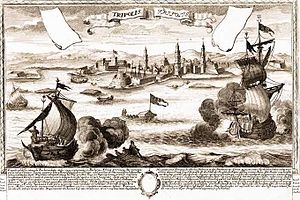Siege of Tripoli (1551)
| Siege of Tripoli | |||||||
|---|---|---|---|---|---|---|---|
| Part of the Ottoman-Habsburg wars | |||||||
 Attack on Tripoli by the Ottomans. caption= |
|||||||
|
|||||||
| Belligerents | |||||||
|
|
|
||||||
| Commanders and leaders | |||||||
|
|
|
||||||
| Strength | |||||||
| 30–200 knights 630 mercenaries |
About 10,000 | ||||||
| Casualties and losses | |||||||
| 630 enslaved | Unknown | ||||||
The Siege of Tripoli occurred in 1551 when the Ottomans besieged and vanquished the Knights of Malta in the fortress of Tripoli, modern Libya. The Spanish had established a fort in Tripoli in 1510, and Charles V remitted it to the Knights in 1530. The siege culminated in a six-day bombardment and the surrender of the city on 15 August.
The siege of Tripoli succeeded an earlier attack on Malta in July, which was repelled, and the successful invasion of Gozo, in which 5,000 Christians captives were taken and brought on galleys to the location of Tripoli.
The city was under the command of Father Gaspard de Vallier, with 30 knights (some authors say 200) and 630 Calabrian and Sicilian mercenaries. The Ottomans had a base since 1531 in the city of Tajura, 20 kilometers to the east, where Khayr al-Din had been based. The Ottomans encircled the fort, and established 3 batteries of 12 guns each.
The French Ambassador to the Ottoman Empire, Gabriel d'Aramon, joined the Ottoman fleet at Tripoli, with two galleys and a galliot, The declared mission of the ambassador was to dissuade the Ottomans from capturing the city, at the request of the Grand Master of Malta, as Malta was not identified as an enemy in the Franco-Ottoman alliance against the Habsburgs. According to later reports, when Sinan Pasha and Dragut refused to lift the siege, on grounds that they were under order to eradicate the Knights of Malta from the African continent, d'Aramon threatened to sail to Constantinople to appeal to sultan Suleiman, but he was then barred from leaving the city until the end of the siege.
...
Wikipedia
